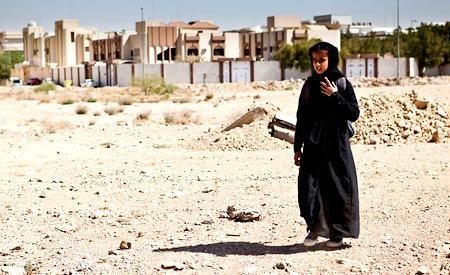Saudi Arabia is a country without movie theatres, a country which restricts women’s rights and prohibits the public mixing of the sexes. It is also the country which produced the film Wadjda, one of the highlights of Powell River Film Festival, February 12 to 16 at Patricia Theatre.
This is Saudi Arabia’s first entry for best foreign language film for the 2014 Academy Awards and surprisingly, the film was made by a female writer/director Haifaa Al-Mansour. Unsurprisingly, she studied cinema overseas and produced her film with international funding. Since the rest of the crew were men, she had to shoot some of the exterior scenes from the inside of a van because it would be inappropriate for a woman to work with men in public in Riyadh.
The film is subtly subversive. By choosing a feisty 11-year-old girl, Wadjda, as the heroine, rather than a grown woman, the director can more easily show the inequality of society. Puberty is a serious milestone for girls. Wadjda can feel the freedom of her childhood slipping away, and a life of being covered in a black niqab and viewing the world through a tiny screen closing in. In her rebellious nature, Wadjda wants a bicycle to compete with the boys in her neighbourhood but girls are discouraged from such activities to protect their virginity. Even their voices are quietened as “a woman’s voice is her nakedness.”
Waad Mohammed’s performance as Wadjda is extraordinary. Her expressive (and sometimes insolent) body language and exasperated eye-rolling would be recognizable to any Canadian parent. Her father is kind, but mostly absent. Wadjda’s mother is unable to have any more children and without a male heir, her father is looking for another wife. Though the story may seem formulaic—girl overcomes all odds to realize her dreams—the acting, especially of Wadjda and a neighbourhood boy is extraordinary, and the ending is far from predictable.
Another superb film is Arctic Defenders. It is directed by noted Montreal director John Walker, and is a documentary which tells the story of the formation of Nunavut. In 1999, Nunavut was carved out of the Northwest Territories, making it the largest, northernmost and newest territory of Canada. With slightly more than 31,000 people, it is also the least populous. And it is almost certainly the least known.
Walker addresses this lack of knowledge in his stunning film. As a teenager in 1968 he went on a supply boat to Resolute Bay. It was a trip that changed his life. He was a wide-eyed innocent, struck by the beauty of the far north. But it was what he learned afterward that motivated this film. In 1957 the Canadian government transplanted the Inuit more than 2,000 kilometres north from their home in Port Harrison, Quebec. The people were simply dropped off by ship and left with no supplies or support. They had never known such cold, or 24-hour darkness in winter. The government had moved them in the name of sovereignty. The unintended consequence was the radicalizing of the Inuit and the formation of Nunavut.
Arctic Defenders has been chosen to show to students at Max Cameron Theatre. It will also be shown at the Patricia for a general audience.
Pass holders are secured a seat at the film showings as long as they arrive at least 15 minutes before showtime. Only 50 passes are available this year, costing $100, and offer admittance to all films and the opening and closing galas. They are available at the Patricia, and after January 15, at the new home of Breakwater Books on Marine Avenue. Tickets are also available for individual films. To reduce costs this year everyone attending the festival needs a membership. Available for a mere $5, it puts the festival on the same level as other major festivals, including Vancouver and Toronto. It also means that the festival committee is not obliged to get a rating for each film, thus saving hundreds of dollars, and even more time and effort. For further information and a complete listing of the films, readers can visit the festival website.



